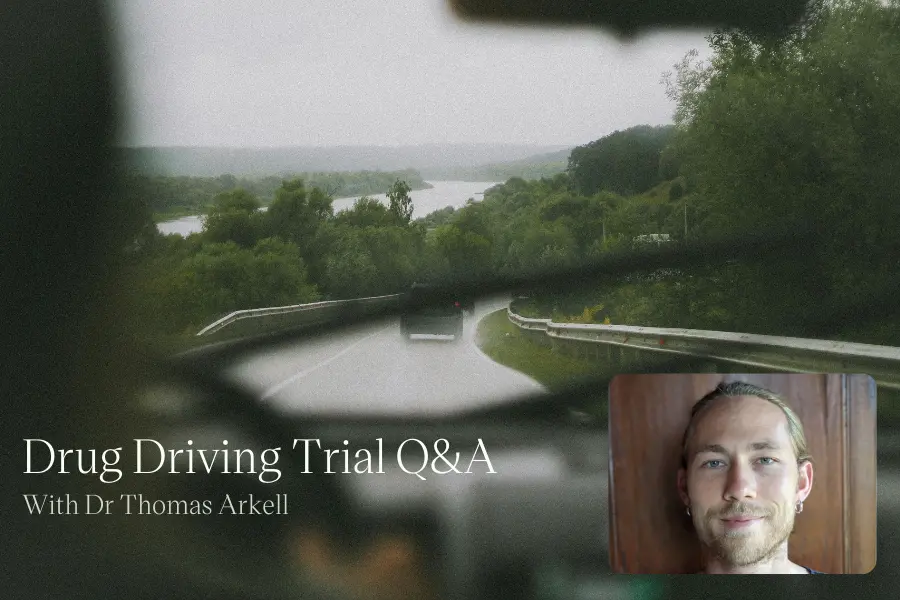Dr Thomas Arkell (BA, PhD) is a researcher in the field of psychopharmacology. Based at Swinburne University’s Centre for Mental Health and Brain Sciences, he is an NHMRC Emerging Leadership Fellow, focused on understanding how cannabis affects the brain and human behaviour, with particular interest in its impact on cognition, driving ability, and day-to-day functioning.
Alongside his research, Dr Arkell works closely with patients to explore the therapeutic potential of medicinal cannabis. His work is informed by a broader interest in the behavioural effects of psychoactive substances, including previous studies involving MDMA and alcohol.
Dr Arkell is part of the team leading the world-first Victorian Drug Driving Trial, a historic study commissioned by the Victorian Government. Swinburne University has been appointed the official research partner for the trial, which is the first of its kind in Australia to examine how medicinal cannabis affects driving performance under real-world conditions.
We invited the Astrid community to share their questions about the trial, then sat down with Dr Arkell to help answer them.
What motivated this trial, and what kind of change could it create for people using medicinal cannabis?
The Victorian Government is aware of the fact that more and more patients are using medicinal cannabis, and that the restriction on driving is an issue for them. The motivation for conducting the trial is to better understand whether Victorians who are prescribed medicinal cannabis (containing THC) can be in control of a vehicle without compromising their safety, or the safety of other road users.
The trial has been delayed multiple times between both the Andrews and Allan Governments. Are we on track to see results by the end of 2025, or is 2026 more realistic?
We estimate the study will take around 18 months from the first drive. Once the study is completed, we will provide the results to the Department of Transport and Planning. The next steps are up to the Victorian Government. For more information about the trial and to keep updated as the trial progresses, you can go to our study website.
How many participants are involved in the trial, and how were they selected? Is there diversity across gender, age, medical conditions, and dosage formats in the trial?
The trial will involve 72 participants who will each complete several days of testing involving comprehensive assessments of driving performance, cognitive function, and a broad range of other measures, including blood and saliva samples and various questionnaires. The trial is enrolling an even number of males and females, an even number of people using oral and inhaled products, and an even number of people using medicinal cannabis for chronic pain, anxiety, and for sleep disorders. We have designed the trial to make it as representative and inclusive as possible.
Why was a minimum dose of 2mg THC set for trial participants?
This is to ensure the results are relevant to medicinal cannabis products that could theoretically impact driving performance. We wished to exclude CBD-only products that can still contain fractional amounts of THC but are not considered to be impairing.
Do you believe the results of this trial could influence cannabis-driving law reform in other states across Australia?
Our role is simply to undertake the study to the highest possible scientific standard and report back to the Government. We expect that other states will be interested in the results of the trial.
The work towards progressing cannabis as a more accepted medicine is welcomed. Do you know of any trials on the horizon that may need participants?
There are several trials happening across the country at the moment. Your best resource for this information is the Australian New Zealand Clinical Trials Registry which is where researchers are required to register their trials.
You will also find more information about our on-track driving trial on this page under the heading ‘An On-track Trial to Assess Driving from Medical Cannabis’.
As access to medicinal cannabis continues to grow, so too does the need for clear, research-backed guidance around its use – especially when it comes to driving and day-to-day safety. Trials like this mark an important step forward in shaping policy that reflects both science and lived experience.
We’re grateful to Dr Arkell for sharing his insights, and to our community for continuing to ask thoughtful, important questions. At Astrid, we remain committed to supporting informed, safe, and empowered choices in plant-based care.
To stay updated on the Victorian Drug Driving Trial, please visit the study website.
